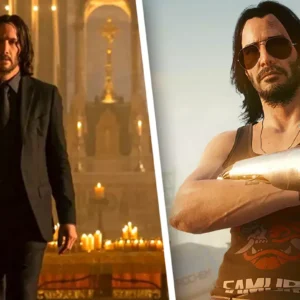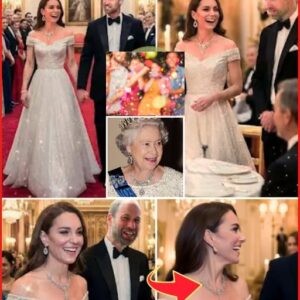The small town of Gondomar, Portugal, stood still on July 5, 2025, as mourners gathered to bid a final farewell to Diogo Jota, the beloved Liverpool and Portugal football star, and his younger brother, André Silva. The air was heavy with grief as tears flowed freely, a community and a global football family united in mourning the tragic loss of two young lives cut short in a horrific car crash. The funeral, held at the Igreja Matriz de Gondomar, was a somber affair, marked by an outpouring of love, tributes, and a shocking revelation from Diogo’s final phone call that has left those close to him reeling.
A Tragic End to a Dream Summer
Diogo Jota, aged 28, and his brother André Silva, 25, perished in the early hours of July 3, 2025, when their Lamborghini veered off the A-52 motorway near Zamora, Spain, and burst into flames. The crash, attributed to a tire blowout during an overtaking maneuver, occurred as the brothers were en route to Santander to catch a ferry back to England. Diogo, who had recently undergone minor lung surgery for a pneumothorax condition, had been advised against flying, leading the siblings to opt for the road trip—a decision that would prove fatal.
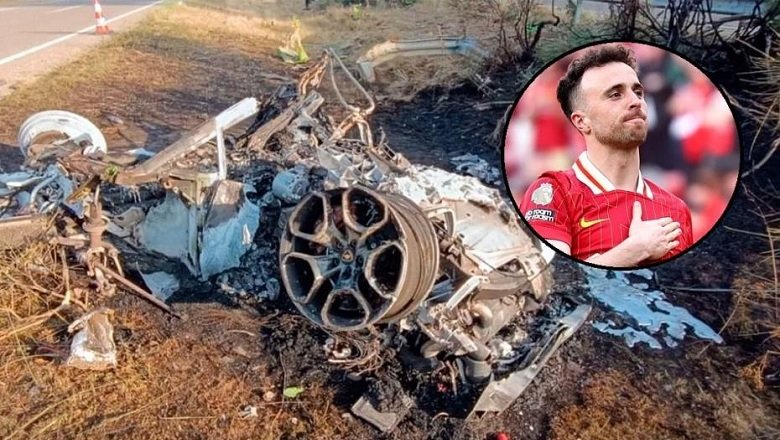
The tragedy struck just 11 days after Diogo married his long-term partner, Rute Cardoso, in a joyous ceremony in Porto on June 22. The couple, who had been together since their teenage years, shared three young children: Denis, Duarte, and a daughter born the previous year. Rute’s Instagram post, captioned “My dream came true,” and Diogo’s heartfelt reply, “I’m the lucky one,” now serve as haunting reminders of a happiness so brutally snatched away.
Diogo’s death came at the peak of his career. A key figure in Liverpool’s 2024/25 Premier League title triumph, he was celebrated for his tireless energy, precise finishing, and selfless play. His final match, a substitute appearance in Portugal’s UEFA Nations League final victory over Spain on June 8, capped a summer of professional and personal highs. André, a professional footballer with Penafiel in Portugal’s second division, was equally cherished for his humility and dedication.
A Community in Mourning
The wake, held on July 4 at the Capela da Ressurreição in Gondomar, saw hundreds of mourners, including Liverpool players, staff, and fans, gather to pay their respects. The small chapel, bathed in dim light, held the wooden coffins of Diogo and André side by side, surrounded by floral tributes. Liverpool captain Virgil van Dijk carried a wreath bearing Diogo’s number 20, while Andrew Robertson honored André with one displaying his number 30. The scene was one of profound sorrow, with quiet sobs and the rustle of paper fans breaking the silence in the 30-degree heat.
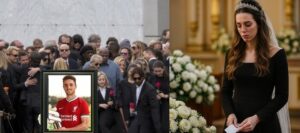
On the morning of the funeral, Gondomar’s streets, once alive with celebration for Diogo’s victories, were lined with locals laying flowers and lighting candles. The procession to the Igreja Matriz was led by Rute Cardoso, Diogo’s parents, and a delegation of Liverpool players, including Alexis Mac Allister, Darwin Núñez, and former captain Jordan Henderson, who was seen wiping tears at Anfield the previous day. Manager Arne Slot and sporting director Richard Hughes also attended, their presence a testament to Diogo’s impact on the club.
Tributes poured in from across the football world. Cristiano Ronaldo, Diogo’s Portugal teammate, wrote, “It doesn’t make sense. Just now we were together in the national team, you had just got married. Rest in Peace, Diogo e André.” Manchester United captain Bruno Fernandes called Diogo a “friend, colleague, and companion in a thousand battles.” Even rivals like Manchester United and Everton expressed their condolences, while Rafael Nadal and LeBron James, a part-owner of Liverpool, shared their grief.
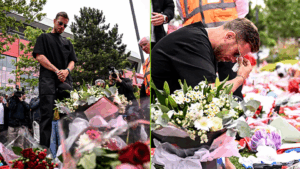
The Shocking Truth of Diogo’s Final Call
Amid the mourning, a revelation from Diogo’s final phone call has added a layer of complexity to the tragedy. Just hours before the crash, Diogo spoke with Álvaro Cerqueira, president of Gondomar SC, the club where he and André often trained during the off-season. The 30-second call, described by Cerqueira as routine yet poignant, revealed a shocking truth: Diogo had been grappling with a sense of unease about his health, despite his outward optimism.
Cerqueira recounted, “We spoke almost every week, and I know he was going through a happy moment. But in that call, he mentioned something that struck me—he said he felt ‘something wasn’t right’ with his body, even after the surgery. He didn’t elaborate, but his voice carried a weight I hadn’t heard before.” Diogo, ever the professional, had delayed his pneumothorax surgery to play in Portugal’s Nations League final and contribute to Liverpool’s title push, a decision that may have exacerbated his condition. His physiotherapist, Miguel Gonçalves, confirmed Diogo’s commitment, noting that he saw the brothers at 8:30 p.m. that evening, just five hours before the crash.
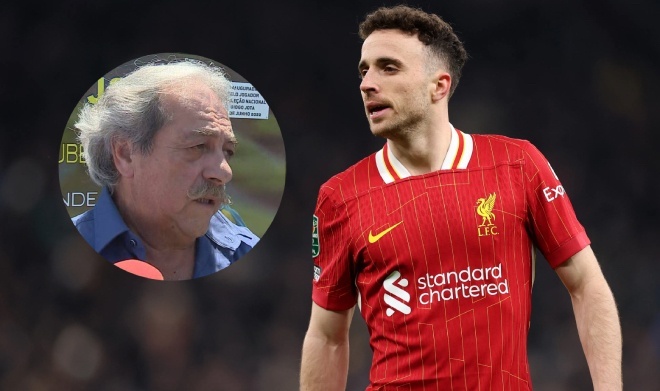
This revelation has sparked speculation about whether Diogo’s health concerns contributed to the accident. While Spanish authorities have pointed to the tire blowout as the primary cause, some close to Diogo wonder if fatigue or discomfort from his recent surgery played a role. Gonçalves firmly denied rumors of partying, emphasizing that the brothers chose to travel at night for cooler weather and to spend time together. Yet, the haunting admission in Diogo’s final call has left Cerqueira and others questioning whether an underlying issue was overlooked.
A Legacy That Endures
Diogo Jota’s legacy is etched in the hearts of Liverpool fans, who dubbed him “Jota the slotter” for his clinical finishing. His 65 goals in 182 appearances, including a derby winner against Everton, cemented his status as a club hero. Beyond statistics, his intelligence, movement, and commitment endeared him to teammates and supporters alike. Arne Slot described him as “the essence of what a Liverpool player should be,” while Virgil van Dijk vowed, “Your legacy will live on, we will make sure of it.”
In Gondomar, Diogo’s humility and connection to his roots were equally celebrated. His barber in Merseyside, Jordan Roberts, shared memories of their friendship, noting gifts of signed shirts and visits to Portugal. The local community, where Diogo rose from humble beginnings to global stardom, mourns not just a footballer but a son, husband, and father.

Liverpool has pledged to honor Diogo with meaningful tributes, with plans to involve fans in commemorating their beloved number 20. UEFA announced moments of silence at Women’s Euro 2025 matches, and Oasis paid tribute during their reunion tour, displaying Diogo’s image during “Live Forever.” The FA is reportedly consulting Liverpool on a Community Shield tribute, reflecting the widespread desire to celebrate his contributions.
A Family’s Unimaginable Loss
For Rute Cardoso and her three children, the loss is incomprehensible. Rute, seen leaving the funeral home in tears, faces the daunting task of raising her family without her childhood sweetheart. Diogo’s parents, who led the private wake, are grappling with the loss of both sons. The football community has rallied around them, with Liverpool chartering a plane to ensure players and staff could attend the funeral, a gesture of solidarity in the face of tragedy.
As Gondomar bids farewell, the echoes of Diogo’s song—“He’s a lad from Portugal / Better than Figo don’t you know”—linger as a fond, rolling tribute. His talent, heart, and will, as The Guardian noted, will be cherished amid the grief. The shocking truth of his final call adds a layer of sorrow, a reminder of the fragility of life and the unspoken burdens even heroes carry. Diogo Jota and André Silva may be gone, but their memory will endure, forever immortalized in the hearts of those they touched.

